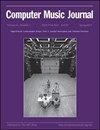Fundamental Sound: A Conversation with Hubert Howe
IF 0.4
Q4 COMPUTER SCIENCE, INTERDISCIPLINARY APPLICATIONS
引用次数: 0
Abstract
Hubert Howe (see Figure 1) received AB, MFA, and PhD degrees from Princeton University, where he studied with J. K. (“Jim”) Randall, Godfrey Winham, and Milton Babbitt. As one of the early researchers in computer music, he was a principal contributor to the development of the Music 4B and Music 4BF programs. In 1968, he joined the faculty of Queens College of the City University of New York (CUNY), where he became a professor of music and director of the electronic music studios. He also taught computer music at the Juilliard School in Manhattan for 20 years. Howe has been a member of the American Composers Alliance since 1974 and has served as its President from 2002 to 2011. He is also a member of the New York Composers Circle and has served as Executive Director since 2013. He is currently active as Director of the New York City Electroacoustic Music Festival, which he founded in 2009. Recordings of his music have been released on the labels Capstone and Centaur, among others. This conversation took place over Zoom during March and April 2022. It begins with a look at Howe’s student years at Princeton and traces his pioneering journey through to his musical activity today. Aspects of his composition and programming work are discussed, as well as his thoughts on pitch structure and timbral approaches to composition. More information about his music and work can be found at http://www.huberthowe.org.基本声音:与休伯特·豪的对话
Hubert Howe(见图1)在普林斯顿大学获得AB、MFA和博士学位,在那里他与j.k.(“Jim”)Randall、Godfrey Winham和Milton Babbitt一起学习。作为计算机音乐的早期研究人员之一,他是music 4B和music 4BF程序开发的主要贡献者。1968年,他加入纽约城市大学皇后学院(CUNY),成为音乐教授和电子音乐工作室总监。他还在曼哈顿的茱莉亚音乐学院教了20年的电脑音乐。自1974年以来,他一直是美国作曲家联盟的成员,并于2002年至2011年担任该联盟的主席。他也是纽约作曲家圈的成员,自2013年起担任执行董事。他目前是2009年创立的纽约市电声音乐节的总监。他的音乐唱片已经在Capstone和Centaur等厂牌上发行。这段对话发生在2022年3月和4月的Zoom上。影片从豪在普林斯顿的学生时代开始,追溯他的开拓之旅,一直到他今天的音乐活动。讨论了他的作曲和编程工作的各个方面,以及他对音高结构和音色作曲方法的想法。更多关于他的音乐和作品的信息可以在http://www.huberthowe.org上找到。
本文章由计算机程序翻译,如有差异,请以英文原文为准。
求助全文
约1分钟内获得全文
求助全文
来源期刊

Computer Music Journal
工程技术-计算机:跨学科应用
CiteScore
1.80
自引率
0.00%
发文量
2
审稿时长
>12 weeks
期刊介绍:
Computer Music Journal is published quarterly with an annual sound and video anthology containing curated music¹. For four decades, it has been the leading publication about computer music, concentrating fully on digital sound technology and all musical applications of computers. This makes it an essential resource for musicians, composers, scientists, engineers, computer enthusiasts, and anyone exploring the wonders of computer-generated sound.
Edited by experts in the field and featuring an international advisory board of eminent computer musicians, issues typically include:
In-depth articles on cutting-edge research and developments in technology, methods, and aesthetics of computer music
Reports on products of interest, such as new audio and MIDI software and hardware
Interviews with leading composers of computer music
Announcements of and reports on conferences and courses in the United States and abroad
Publication, event, and recording reviews
Tutorials, letters, and editorials
Numerous graphics, photographs, scores, algorithms, and other illustrations.
 求助内容:
求助内容: 应助结果提醒方式:
应助结果提醒方式:


